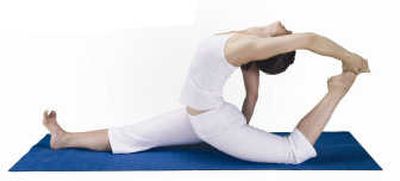Regaining control

Jackie Kittel returned to her yoga practice as soon as she was able following breast-cancer surgery four years ago.
Kittel had been an Iyengar yoga instructor since 1994, so it was only natural that she would continue.
“Following treatment, that was my main healing modality,” says Kittel of Spokane.
Now, Kittel is helping scientists from Washington State University in Spokane study yoga and its effects on other breast cancer survivors.
“It’s empowering to help them feel some control again over their bodies,” she says.
Sally Blank, an associate professor of exercise physiology and longtime yoga practitioner herself, started the research with her colleagues in 2003. They are now ready to submit two papers for peer review based on a small study of 26 women.
Blank and her colleagues admit this is an area in need of further study, which they are continuing.
And they say, at this point, the results can’t be generalized to other medical conditions.
But their preliminary findings are promising.
In Blank’s study, cancer survivors participating in an eight-week yoga program showed improved immune response. Their bodies made more cancer-killing cells than those of nonparticipants.
Plus, “That improvement was correlated with improvement in the depression scores in the women,” she says.
Research published this month in the Journal of Clinical Oncology by New York researchers also found that women undergoing treatment for breast cancer felt better by taking regular yoga classes.
Those involved in the yoga program filled out about a dozen questionnaires dealing with quality-of-life issues, says Mel Haberman, Blank’s collaborator, director of the WSU Cancer Prevention and Research Center, and a professor of nursing.
Most of the markers surveyed showed improvement or stability, Haberman says. The participating women reported reduced stress and pain and an increase in sense of personal control.
A large number of the survivors were clinically depressed when they began the program.
They remained depressed at the end, though the depression eased slightly, Haberman says.
“It was significant in the right direction, but they were still depressed,” he says.
And many of the women reported feeling isolated from their friends, even at the end of the yoga sessions.
In earlier studies, Haberman noted, the women started to form new friendships among other survivors in the yoga class.
“They are changing their circle of friends,” he says.
Haberman adds, “To me, the most interesting finding is that every woman goes through this experience of breast-cancer survivorship in their own way and drawing on their own strengths.”
Dr. Joni Nichols of Cancer Care Northwest also helped with the research.
Blank and the others chose to focus on the style of yoga called Iyengar because it is fairly vigorous and emphasizes proper alignment, along with strength, flexibility and stress reduction.
“It’s the only type of yoga that uses props,” Blank says.
“Anyone with any ability can rely on props to help them align their postures and get the full benefit.”
Kittel now teaches yoga classes specifically for breast-cancer survivors and she taught some of the subjects in the study. (She also teaches classes for the general public.)
She has seen the boost in self-esteem that comes from mastering yoga poses.
“What I noticed is that the women in my breast-cancer group were so thrilled when they were able to do moves that required a lot of arm strength,” she says.
Kittel also likes to walk and run for cardiovascular exercise.
But only yoga provides the body-mind workout, she says.
“I do think there is something really amazingly wonderful about yoga that helps balance your nervous system,” she says.